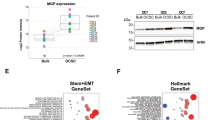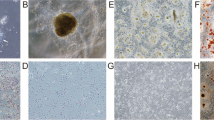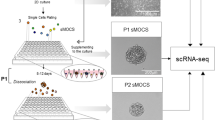Abstract
Cancer stem cells (CSCs) have been identified in solid tumors and cancer cell lines. In this study, we isolated a series of cancer cell clones, which were heterogeneous in growth rate, cell cycle distribution and expression profile of genes and proteins, from ovarian tumor specimens of a patient and identified a sub-population enriched for ovarian CSCs defined by CD24 phenotype. Experiments in vitro demonstrated CD24+ sub-population possessed stem cell-like characteristics of remaining quiescence and more chemoresistant compared with CD24− fraction, as well as a specific capacity for self-renewal and differentiation. In addition, injection of 5 × 103 CD24+ cells was able to form tumor xenografts in nude mice, whereas equal number of CD24− cells remained nontumorigenic. We also found that CD24+ cells expressed higher mRNA levels of some ‘stemness’ genes, including Nestin, β-catenin, Bmi-1, Oct4, Oct3/4, Notch1 and Notch4 which were involved in modulating many functions of stem cells, and lower E-cadherin mRNA level than CD24− cells. Altogether, these observations suggest human ovarian tumor cells are organized as a hierarchy and CD24 demarcates an ovarian cancer-initiating cell population. These findings will have important clinical applications for developing effective therapeutic strategies to treat ovarian cancer.
This is a preview of subscription content, access via your institution
Access options
Subscribe to this journal
Receive 50 print issues and online access
$259.00 per year
only $5.18 per issue
Buy this article
- Purchase on SpringerLink
- Instant access to full article PDF
Prices may be subject to local taxes which are calculated during checkout




Similar content being viewed by others
References
Ahn SM, Goode RJ, Simpson RJ . (2008). Stem cell markers: insights from membrane proteomics?. 8: 4946–4957.
Al-Hajj M, Wicha MS, Benito-Hernandez A, Morrison SJ, Clarke MF . (2003). Prospective identification of tumorigenic breast cancer cells. Proc Natl Acad Sci USA 100: 3983–3988.
Baba T, Convery PA, Matsumura N, Whitaker RS, Kondoh E, Perry T et al. (2009). Epigenetic regulation of CD133 and tumorigenicity of CD133+ ovarian cancer cells. Oncogene 28: 209–218.
Bapat SA, Mali AM, Koppikar CB, Kurrey NK . (2005). Stem and progenitor-like cells contribute to the aggressive behavior of human epithelial ovarian cancer. Cancer Res 65: 3025–3029.
Bonnet D, Dick JE . (1997). Human acute myeloid leukemia is organized as a hierarchy that originates from a primitive hematopoietic cell. Nat Med 3: 730–737.
Cannistra SA . (2004). Cancer of the ovary. N Engl J Med 351: 2519–2529.
Chambers I, Smith A . (2004). Self-renewal of teratocarcinoma and embryonic stem cells. Oncogene 23: 7150–7160.
Cheng T . (2004). Cell cycle inhibitors in normal and tumor stem cells. Oncogene 23: 7256–7266.
Collins AT, Berry PA, Hyde C, Stower MJ, Maitland NJ . (2005). Prospective identification of tumorigenic prostate cancer stem cells. Cancer Res 65: 10946–10951.
Deininger M . (2004) In: Stein GS and Pardee AB (eds). Cell Cycle and Growth Control. John Wiley & Sons Academic Publishers: Massachusetts, 667–703.
Doyle LA, Ross DD . (2003). Multidrug resistance mediated by the breast cancer resistance protein BCRP (ABCG2). Oncogene 22: 7340–7358.
Ferrandina G, Bonanno G, Pierelli L, Perillo A, Procoli A, Mariotti A, et al. (2008). Expression of CD133-1 and CD133-2 in ovarian cancer. Int J Gynecol Cancer 18: 506–514.
Friel AM, Sergent PA, Patnaude C, Szotek PP, Oliva E, Scadden DT et al. (2008). Functional analyses of the cancer stem cell-like properties of human endometrial tumor initiating cells. Cell Cycle 7: 242–249.
Fuchs E, Tumbar T, Guasch G . (2004). Socializing with the neighbors: stem cells and their niche. Cell 116: 769–778.
Goranov AI, Cook M, Ricicova M, Ben-Ari G, Gonzalez C, Hansen C et al. (2009). The rate of cell growth is governed by cell cycle stage. Genes Dev 23: 1408–1422.
Hermann PC, Huber SL, Herrler T, Aicher A, Ellwart JW, Guba M et al. (2007). Distinct populations of cancer stem cells determine tumor growth and metastatic activity in human pancreatic cancer. Cell Stem Cell 1: 313–323.
Jaksch M, Munera J, Bajpai R, Terskikh A, Oshima RG . (2008). Cell cycle-dependent variation of a CD133 epitope in human embryonic stem cell, colon cancer, and melanoma cell lines. Cancer Res 68: 7882–7886.
Kristiansen G, Denkert C, Schluns K, Dahl E, Pilarsky C, Hauptmann S . (2002). CD24 is expressed in ovarian cancer and is a new independent prognostic marker of patient survival. Am J Pathol 161: 1215–1221.
Li C, Heidt DG, Dalerba P, Burant CF, Zhang L, Adsay V et al. (2007). Identification of pancreatic cancer stem cells. Cancer Res 67: 1030–1037.
Monzani E, Facchetti F, Galmozzi E, Corsini E, Benetti A, Cavazzin C et al. (2007). Melanoma contains CD133 and ABCG2 positive cells with enhanced tumourigenic potential. Eur J Cancer 43: 935–946.
Naora H, Montell DJ . (2005). Ovarian cancer metastasis: integrating insights from disparate model organisms. Nat Rev Cancer 5: 355–366.
Pardal R, Clarke MF, Morrison SJ . (2003). Applying the principles of stem-cell biology to cancer. Nat Rev Cancer 3: 895–902.
Patrawala L, Calhoun T, Schneider-Broussard R, Zhou J, Claypool K, Tang DG . (2005). Side population is enriched in tumorigenic, stem-like cancer cells, whereas ABCG2+ and ABCG2− cancer cells are similarly tumorigenic. Cancer Res 65: 6207–6219.
Schmalhofer O, Brabletz S, Brabletz T . (2009). E-cadherin, beta-catenin, and ZEB1 in malignant progression of cancer. Cancer Metastasis Rev 28: 151–166.
Seigel GM, Hackam AS, Ganguly A, Mandell LM, Gonzalez-Fernandez F . (2007). Human embryonic and neuronal stem cell markers in retinoblastoma. Mol Vis 13: 823–832.
Song J, Shih Ie M, Salani R, Chan DW, Zhang Z . (2007). Annexin XI is associated with cisplatin resistance and related to tumor recurrence in ovarian cancer patients. Clin Cancer Res 13: 6842–6849.
Stupp R, Hegi ME . (2007). Targeting brain-tumor stem cells. Nat Biotechnol 25: 193–194.
Szotek PP, Pieretti-Vanmarcke R, Masiakos PT, Dinulescu DM, Connolly D, Foster R et al. (2006). Ovarian cancer side population defines cells with stem cell-like characteristics and mullerian inhibiting substance responsiveness. Proc Natl Acad Sci USA 103: 11154–11159.
Wicha MS, Liu S, Dontu G . (2006). Cancer stem cells: an old idea—a paradigm shift. Cancer Res 66: 1883–1890; discussion 1895–1896.
Zhang S, Balch C, Chan MW, Lai HC, Matei D, Schilder JM et al. (2008). Identification and characterization of ovarian cancer-initiating cells from primary human tumors. Cancer Res 68: 4311–4320.
Acknowledgements
This work was supported by Korea Healthcare Technology R&D Project, Ministry for Health, Welfare and Family Affairs, Republic of Korea (A062598; NHC) and by the National Research Foundation of Korea (NRF) grant funded by the Korea Government (MEST) (No. 20090079165; CNH).
Author information
Authors and Affiliations
Corresponding author
Ethics declarations
Competing interests
The authors declare no conflict of interest.
Additional information
Supplementary Information accompanies the paper on the Oncogene website
Supplementary information
Rights and permissions
About this article
Cite this article
Gao, MQ., Choi, YP., Kang, S. et al. CD24+ cells from hierarchically organized ovarian cancer are enriched in cancer stem cells. Oncogene 29, 2672–2680 (2010). https://doi.org/10.1038/onc.2010.35
Received:
Revised:
Accepted:
Published:
Issue Date:
DOI: https://doi.org/10.1038/onc.2010.35



